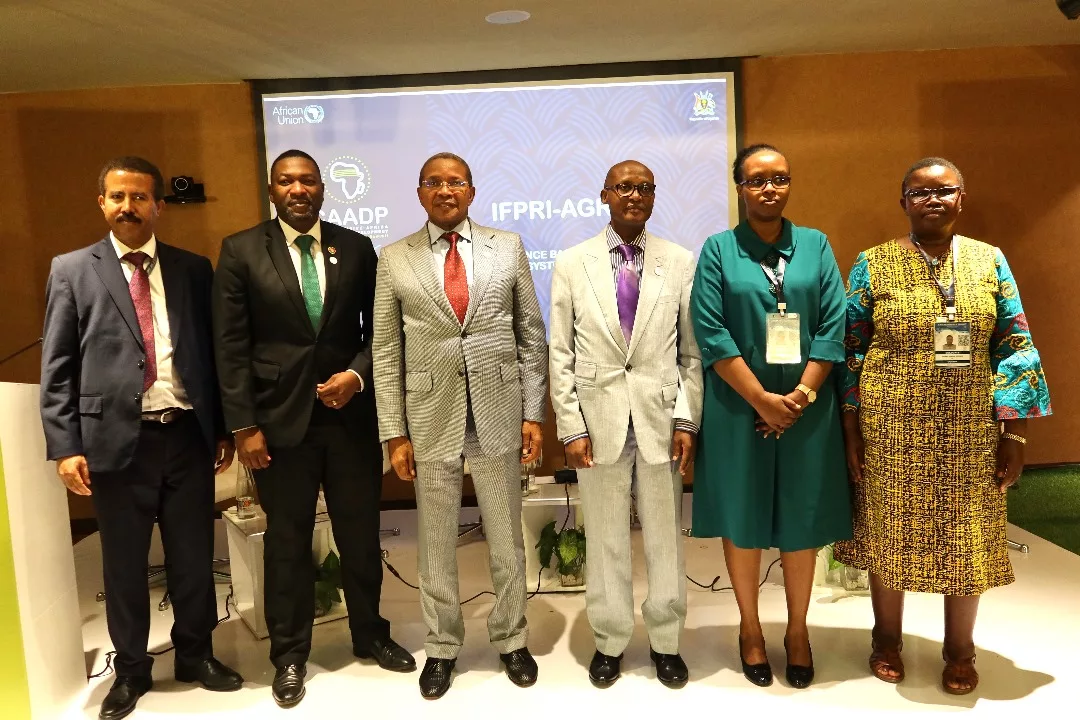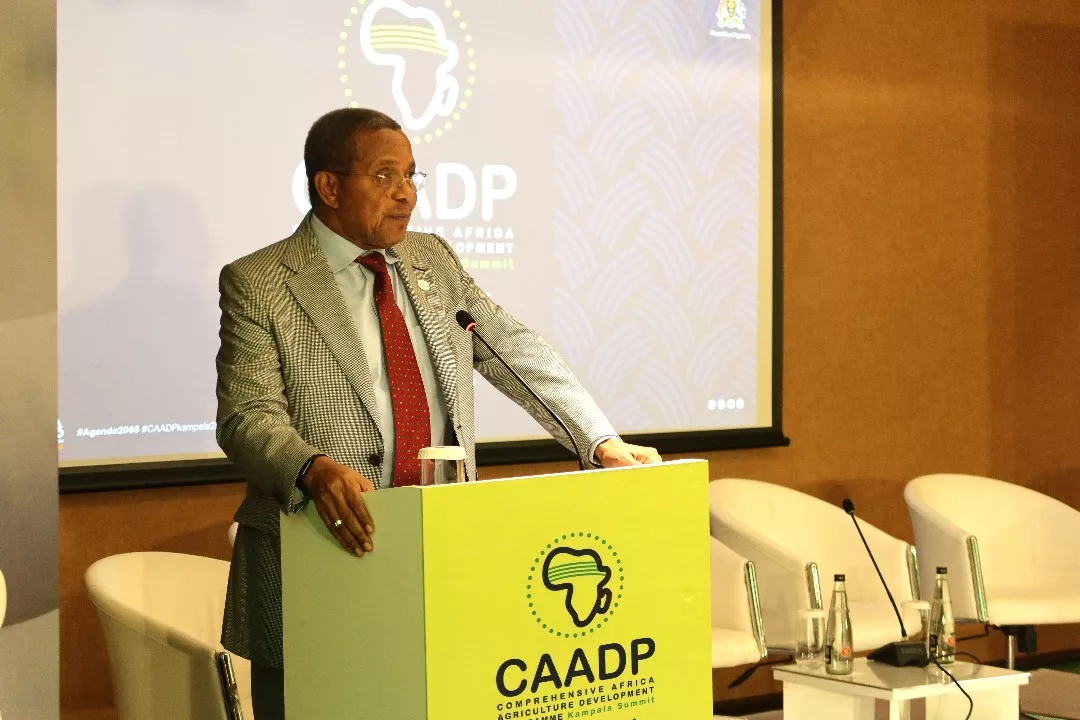|
Getting your Trinity Audio player ready...
|
KAMPALA, UGANDA – Evidence-based policies and strategies are essential to drive sustainable food systems transformation, without which stakeholders would not be able to successfully implement the Comprehensive Africa Agriculture Development Programme (CAADP) and deliver the African transformation, HE Jakaya Kikwete, the former President of Tanzania has said.
He made the remarks in his keynote address titled “Evidence-Based Approaches to Strengthen Food Systems Transformation Across Africa” during a side event on Implementing the CAADP-Kampala Agenda on Thursday 9th January 2025 at the Speke Munyonyo Resort in Uganda on 9 January 2025 during the African Union Extraordinary Summit on CAADP.

The side event was jointly organized by the Alliance for a Green Revolution in Africa (AGRA) and the International Food Policy Research Institute (IFPRI).
“In this session, we are discussing the importance of evidence-based policies and strategies to drive sustainable food systems transformation – without which we would not be able to successfully implement CAADP and deliver the African transformation. So important is the issue of implementing evidence-based policies and strategies that the African Union, through the leadership of the Commission and AUDA-NEPAD, and in collaboration with the RECs, member states, and several partners developed the CAADP Agrifood Systems Transformation Implementation Guidelines.
“The idea was to support countries in the implementation of the overarching goal of transformation of African agriculture and African food systems. I am delighted that this side session is focused on this cardinal matter. I commend the AU Commission and AUDA-NEPAD for this effort. These guidelines will be a big assistance, incorporating lessons from the past two CAADPs and assisting countries to put in place the necessary systems, structures, and processes to drive implementation,” President Kikwete said.
He said implementation requires several things to be done.
“This is what I learned when I was President of the United Republic of Tanzania between 2005 to 2015 and after that as a member of the Board of AGRA. In my time as President of my dear country, we conceived several initiatives and measures to advance the transformation of agriculture and food systems in Tanzania. Indeed, they did help us to accelerate the implementation of our objectives. I would like to underscore the fact that, the policy initiatives and measures that we put in place were guided by evidence-based knowledge and experience,” HE Kikwete said.
He shared some key lessons from that experience, some of which have also been seen in other countries and periods across the continent.
H was elected President in December 2005 and again in October 2010. When he was elected for the first time in 2005, Tanzania was going through one of the worst droughts in its history. Hydropower plants did not have enough water for power generation. So, there was an acute shortage of electricity. Food production especially of the main staples like rice and maize was severely affected forcing about 3.778 million Tanzanians to face the existential problem of acute hunger and famine.
The government was faced with the daunting challenge of making sure that nobody died of food shortage. Fortunately, there was some maize in the Strategic Grain Reserve and there was enough forex to enable Tanzania to import food so they safely braved the challenge.
“The lessons we learnt from the food crisis we landed made us think about how best to respond to such a crisis if it were to happen again and about how to stop it from happening. About the first question, we agreed to make sure that the national grain reserve had good stocks all the time. We decided to increase the reserve from 200,000 tons to 400,000 tons. Also, the National Forex Reserve had enough resources to be able to deal with emergencies. This meant increasing export drive and nurturing other sections which brought forex to the nation. Tourism being the most prominent one, it also meant being frugal in the use of our meagre foreign exchange resources to make sure it is adequate for emergencies.
“But the overarching decision was about how to transform our agriculture to ensure food security, poverty reduction and national growth. We embarked on a soul-searching evaluation of the state of agriculture in Tanzania. This exercise was spearheaded by the Ministry of Agriculture. After discussing the proposal we conceived and launched the Agricultural Sector Development Programme. Factors constraining agricultural transformation and growth were identified and pertinent proposals on initiatives and measures to take were made. It was a seven-year programme which ended during the 5th phase of government. I was delighted when I learnt that ASDP II was launched,” HE Kikwete said.
It is heartwarming to note that there has been a turnaround. There is a significant increase in productivity and production. Tanzania enjoys self-food sufficiency. In rice, for example, Tanzania is now the largest producer in East and Southern Africa. Since 2020, the country has been exporting over 200,000 tons of rice, up from 10,000 tons in 2018. Major constraints were addressed through interventions on irrigation, mechanization, fertilizers, herbicides, pesticides, infrastructure, marketing systems, extension services and others.
“But much needs to be done because agriculture is peasant-based and both productivity and production are still low. The encouraging thing is that the government is highly committed. In the relations between the government and the private sector, there is the Tanzania Business Council. It brings together the government leadership and the representatives of the private sector. The Council Chair is the President. In one of the meetings, we discussed the situation in the agricultural sector. We identified the bottlenecks and agreed on what needed to be done. We all agreed agriculture should be given top priority by all of us hence the strategy Kilimo Kwanza. It meant getting the private sector to actively participate in the development of the agricultural sector.
“They can get involved in farming and provide services for the sector like machinery, inputs etc. Also, they provide a market for farm produce. This increased involvement of the private sector is partly responsible for the increased productivity and production by smallholder farmers. The involvement of the private sector was not limited to local Tanzanians. We also brought the international private sector. It is this involvement which made us succeed in the SAGCOT Initiative.”
Kilimo Kwanza, as an all-encompassing but targeted and prioritized strategy, was key for enacting evidence-based policies. For example, it helped Tanzania implement seed sector reforms following the Seed Act of 2003 which set up the Seed Certification Institute (TOSCI). Also to implement agriculture research policies, Tanzania’s Fertilizer Act of 2009 and initial regulations were meant to improve regulation of the fertilizer sector, and various others.
Crucially, HE Kikwete said that it was important that these policies were not looked at in isolation, distinct from each other, but as a system of policies that reinforced and interacted with each other. Again, this is the importance of a strategy. Plan like Kilimo Kwanza – which although most people thought of it as a document, it was much more than that – it was the guiding star for what Tanzania actually did, how it prioritized resources and how it ensured progress was being made.
The other key factor that helped drive implementation was the setting up of a delivery mechanism. It was not just for agriculture but for other sectors as well which was called Big Results Now. It was a new way of organizing things, tracking progress and resolving challenges in good time. It can partly be counted as contributing to the achievements made in the agricultural sector and others. It was extremely useful to the leaders to know what was happening and guide progress.
Several bottlenecks – and this was the case in Kilimo Kwanza, were complex issues involving numerous Ministries and Agencies, development partners, the private sector and civil society. They needed time and attention to resolve, given conflicting positions, resource shortages, funding gaps and institutional capacity constraints. The embedding of evidence of what works and what the impacts were into this process was particularly helpful for Tanzania to unlock policy implementation challenges, and flagship implementation issues, such as SAGCOT.
“A third factor was political leadership. I had to remain engaged, as President, and ensure that my team of Ministers and PSs were also remaining engaged and empowered to drive implementation. We needed accountability, follow-up and problem-solving. We needed to call people in to meet to resolve issues and chart the way forward on our strategy. The use of evidence here was also important – evidence of what is working better, evidence of what research is telling us, evidence from what private actors were saying the problems undermining investment were, evidence of how things were actually turning out in the farms, evidence of what investors needed and so on. This was also important for handling complex political economy challenges that inevitably set the context for which implementation needed to happen. We couldn’t be blind to that evidence either.
“In conclusion, I must mention that I am excited by what I see across the continent when it comes to evidence-based policy, strategy and implementation. Many are learning from what countries like Vietnam, Malaysia – who had helped me with Big Results Now – Cambodia and others have done. Countries like Ethiopia, Morocco, and Rwanda, but even Sierra Leone, Benin, Senegal, Angola, Zambia, Zimbabwe, Uganda, Togo, Burkina Faso, Nigeria and the current President of Tanzania too, are placing much more emphasis on ensuring a sound strategy and delivery mechanisms that drive a coherent and targeted approach to policy and programme implementation around agriculture and food systems.
“While I am encouraged by this, I call on implementation mechanisms for evidence-based policies and strategies to be strengthened even more – and to be instituted where missing – so leaders and civil servants alike have the tools necessary to overcome the tricky and complex implementation challenges that they face daily. This stands in our way to a successful implementation of the new CAADP and we must do all we can to overcome this critical challenge. The organization I am on the board of, AGRA – among others – stands ready to support governments with this critical challenge.”






